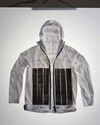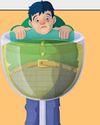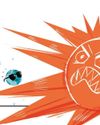
When it comes to earthquakes, always expect the unexpected. That’s the message coming from seismologists Prof Éric Calais, of the École Normale Supérieure (ENS) in Paris, and JeanFrançois Ritz, Director of Montpellier’s CNRS Laboratoire Géosciences.
Underpinning their advice is the reality that Earth sometimes shakes in places it shouldn’t. These mysterious events, called intraplate earthquakes, happen far from the active margins of tectonic plates and in places that are otherwise geologically quiet. Gaining a better understanding of them and an explanation for them has become the mission of the French scientists.
UNPREDICTABLE AND DESTRUCTIVE
The rocky plates that make up the brittle, outer carapace of our world are performing a slow dance across the face of the planet, moving at about the same rate that a person’s fingernails grow. While nearly all the geological action worth talking about takes place where the tectonic plates meet, intraplate quakes are different, occurring in the interiors of the plates far from the margins.
There are good, potentially lifesaving, reasons for Calais and Ritz to want to shed more light on them. Intraplate quakes are rare: the number of significant shakes is tiny compared to what happens at the edges of the plates, with Calais noting that only 20 of a magnitude of 6 and above have been recorded since 1974. That’s less than half of one per cent of the number of similarly sized quakes at plate margins over the same time.
Their rarity, and typically long return periods, makes them difficult to predict, yet they’re capable of causing immense destruction in unprepared urban centres that never regarded quakes as a problem.
This story is from the December 2023 edition of BBC Science Focus.
Start your 7-day Magzter GOLD free trial to access thousands of curated premium stories, and 9,000+ magazines and newspapers.
Already a subscriber ? Sign In
This story is from the December 2023 edition of BBC Science Focus.
Start your 7-day Magzter GOLD free trial to access thousands of curated premium stories, and 9,000+ magazines and newspapers.
Already a subscriber? Sign In

NOW YOU SEE ME, NOW YOU DON'T
Scientists around the world are working on ways to hide us from sight. But how close are we to developing tech that could make us invisible?

UNCORKED POTENTIAL
How much good can ditching drink for a month really do? Answer: a whole lot. In fact, science shows even short-term abstinence could unlock a cocktail of lasting benefits

Scientists discover when humans and dogs became friends
The relationship spans thousands of years, but experts might have pinpointed the first connection

Why it's so hard to kick a gambling addiction
We now know that gambling can be as addictive as drugs, but there are factors that can make it even harder to quit

How much could Ozempic change our world?
The weight-loss drug has made headlines and broken sales records, but what does it mean for our future?

WHY DOES DRINKING ALCOHOL MAKE IT SO MUCH HARDER TO LOSE WEIGHT?
While enjoying the occasional glass of wine or pint of beer may seem harmless, regular or excessive alcohol consumption can significantly hinder your weight-loss journey for a few reasons:

Why do so many New Year's resolutions fail?
Establishing positive new habits is hard at any time of year. But there are ways to stop your attempts ending in failure

'Extreme' solar radiation storm could hit Earth
Sun-like stars may have tantrums far more frequently than we thought

HOW CAN I BANISH THE JANUARY BLUES?
Dark mornings, long chilly evenings and short days; many people find January tough.

Neutrinos are getting in the way of dark matter detection
These troublesome particles are difficult to detect, but they're starting to show up in places where they're not wanted